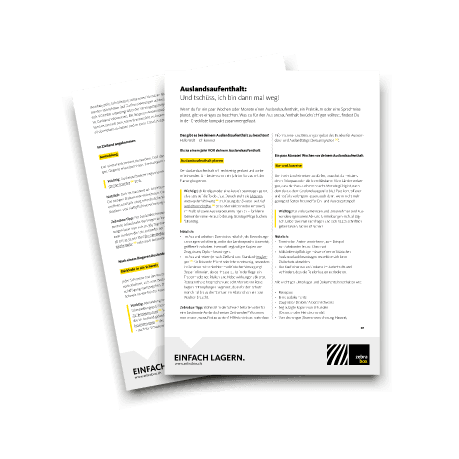Ready to move abroad? Careful planning makes all the difference
Going abroad: whether you’re setting off for a short trip to study a language abroad or leaving Switzerland to live abroad more long-term, the adventure begins months before you depart with the preparation at home.

Going to live abroad ranks near the top of many people's bucket list. You might want to live abroad to find your dream job, spend time studying overseas, study a language abroad, find an internship or even finally take that long-awaited break from work. There are many reasons for travelling, sometimes it's personal, sometimes professional, but hey, do you always have to have a reason? No! You might just simply want to live somewhere else for a while.
Every year about 28,000 Swiss citizens choose to live abroad. Most return eventually, some never do. Out of Switzerland – into adventure. Preferably immediately, not later. But hold on: a stay abroad must be well organised. Helpful tips and information can be found on the homepage of the Swiss Federal Department of Foreign Affairs.
Have you thought of everything? Be ready for your trip abroad
Every journey is unique, and so is the planning. It has been proven time and again that the better you prepare, the smoother everything will go. By the way, going to live abroad or study language abroad isn’t just for people in their twenties, others make the decision much later in life.
If your grandma, for example, is fond of travelling then get her to check out Granny Au Pair. Here, families from all over the world are searching for nice grandmas.
No matter your age, a few basic preparations are important for everyone. If you want to start even earlier and plan your world trip step by step, read our article on this topic. Here’s a practical overview of the key points you should take care of before your departure:
Documents and entry requirements
- A valid passport is required for entry into another country. Sometimes a national ID card can also be used. Check the expiration date. Some countries require that the passport is valid for at least six months beyond the date of departure!
- Depending on the destination, you will need:
- Electronic entry permit
- Visa /residence permit (does it correspond to the length of your stay?)
- Vaccinations
- Possibly a work permit
- What are the entry requirements for the country you are visiting? Pay attention to any differences in requirements for tourists, students and paid and unpaid work!
Studying and language courses
- What are the requirements for studying or taking courses in the host country?
- Are your diplomas, certificates, and Swiss vocational qualifications recognised?
- Do you need translations or certifications of your documents?
- Do you need to have them translated/certified in order to work in the host country?
👉 The guidebook “Temporary stay abroad” provides detailed information on notification obligations, insurance, recognition of qualifications, and more.
Insurance
Sort out your insurance (health, accident and liability insurance are essential when you’re abroad!)
Important: take out additional insurance such as international medical insurance in case you become ill or have an accident.
Finances abroad
- Check with your bank if you can keep your account and if your credit card works abroad.
- Check foreign transaction fees
- Look into alternative banking services, e.g., via the Organization of the Swiss Abroad (OSA).
Mobility and customs
- Do you want to drive or rent a car abroad? Check if your Swiss driving licence is sufficient or if you need an international licence.
- Customs regulations: especially important for household goods and relocation items.
- Make copies of your most important documents (passport, visa, deregistration) and store them in a secure cloud (Dropbox, Drive, iCloud).
Deregister from Switzerland: yes or no?
When preparing to travel or live abroad there is one crucial question: should I deregister or not? However, this can’t be answered with a simple yes or no. Sometimes deregistration makes sense, it is often compulsory and therefore unavoidable. Here's the rub: you don't necessarily get to decide for yourself – your local municipality will have something to say on the matter!
General rule: if you decide to travel or live abroad for more than three months, give up your accommodation and don't plan on coming back anytime soon, then you will need to deregister at the residents’ registration office.
Expectations: Some municipalities and cantons deal with it differently or turn a blind eye (or two!) if, for example, you still hold on to your apartment or job in Switzerland. Then you might be able to travel for longer than three months without having to deregister. Is that the case in your area? How long can you live or travel abroad for without having to deregister? Three months, six months, more? You can only find out the answer at your local residents' registration office. If you want to travel or live abroad for longer than a year, then deregistration is usually compulsory!
Preparation also includes: weighing pros and cons
The bad news: deregistration is a lot of effort and involves filling in a lot of paperwork. The good news: if you move back to Switzerland, you will already be familiar with the process and the effort required won't be as big a shock the second time round.
Advantages of deregistration:
- No tax obligation in Switzerland
- Termination of contracts and insurance possible
- Access to pension fund or pillar 3a savings
- More freedom
Disadvantages of deregistration:
- Administrative effort during deregistering and re-registering
- Changes in health insurance, accident insurance and other contracts (sometimes unfavourable)
- Possible limitations for your bank account
- Must pay any outstanding taxes
- Gaps in AHV contributions if unpaid
- Possible exclusion from pension fund if not employed
- Must appoint a representative for administrative matters in Switzerland
👉 Find out about the exact reporting obligations from your local residents’ registration office. It is always best to be on the safe side and ask – remember to get everything in writing. And don't leave it until just before you're about to leave! It is important to look into whether you need to deregister, otherwise you might have difficulties at the border, especially with your belongings! Only when all the formalities are complete, the documents have been submitted in a timely manner (!) and all taxes have paid is there nothing left to stand in your way of living or studying overseas. Well, almost nothing…
Short term stays: what to do with your accommodation?
Whether au pair, internship, language course, or voluntary work, if you want to live abroad for a few weeks or perhaps months and then return to your old life? If you don't have your own apartment and live with your parents, you've got it easy. Your room will probably stay just the same as it has always been and you don't need to do anything else. If you rent a shared apartment or your parents want to use your room while you're away then you will need to free up some space. No problem! In both cases, storing your furniture is the ideal solution.
Everyone that rents has to make the decision: give notice on your flat or room (warning: notice period is often 3 months) or keep renting it? If you can afford to pay rent, possibly two – here and abroad – then everything can carry on as normal. But if you're planning to live abroad for longer or want to travel for a few months or even a year and could do with a bit of extra cash, then subletting could be an option.
Registered in your host country? Your rights and obligations as a Swiss abroad
Swiss citizens living abroad are Swiss nationals that live temporarily or permanently outside of Switzerland. The Swiss Abroad Act (or ASG) governs the fundamental rights and obligations of Swiss citizens living abroad. If you have deregistered from your municipality, you must register with the relevant representation abroad (embassy or consulate) in your new place of residence and be entered in the Register of the Swiss Abroad within 90 days.
Required documents:
- Swiss passport or national ID
- Confirmation of deregistration
- If available: certificate of origin (Heimatschein)
This also applies when using the FDFA online desk. FDFA is the Federal Department of Foreign Affairs. It helps with the preparations for migration and return migration and offers a registration service for trips abroad (including business trips) in order to locate and contact you more easily in a crisis situation.



